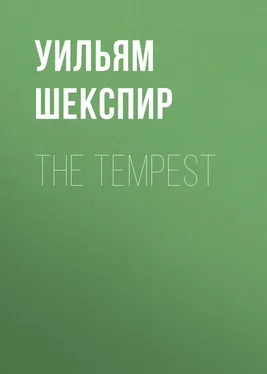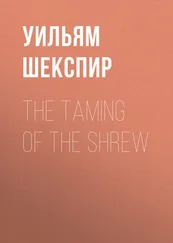Уильям Шекспир - The Tempest
Здесь есть возможность читать онлайн «Уильям Шекспир - The Tempest» — ознакомительный отрывок электронной книги совершенно бесплатно, а после прочтения отрывка купить полную версию. В некоторых случаях можно слушать аудио, скачать через торрент в формате fb2 и присутствует краткое содержание. Жанр: Европейская старинная литература, Драматургия, foreign_dramaturgy, на английском языке. Описание произведения, (предисловие) а так же отзывы посетителей доступны на портале библиотеки ЛибКат.
- Название:The Tempest
- Автор:
- Жанр:
- Год:неизвестен
- ISBN:нет данных
- Рейтинг книги:5 / 5. Голосов: 1
-
Избранное:Добавить в избранное
- Отзывы:
-
Ваша оценка:
- 100
- 1
- 2
- 3
- 4
- 5
The Tempest: краткое содержание, описание и аннотация
Предлагаем к чтению аннотацию, описание, краткое содержание или предисловие (зависит от того, что написал сам автор книги «The Tempest»). Если вы не нашли необходимую информацию о книге — напишите в комментариях, мы постараемся отыскать её.
The Tempest — читать онлайн ознакомительный отрывок
Ниже представлен текст книги, разбитый по страницам. Система сохранения места последней прочитанной страницы, позволяет с удобством читать онлайн бесплатно книгу «The Tempest», без необходимости каждый раз заново искать на чём Вы остановились. Поставьте закладку, и сможете в любой момент перейти на страницу, на которой закончили чтение.
Интервал:
Закладка:
Which is from my remembrance. Please you, farther.
PROSPERO. My brother and thy uncle, call'd Antonio-
I pray thee, mark me that a brother should
Be so perfidious. He, whom next thyself
Of all the world I lov'd, and to him put
The manage of my state; as at that time
Through all the signories it was the first,
And Prospero the prime duke, being so reputed
In dignity, and for the liberal arts
Without a parallel, those being all my study-
The government I cast upon my brother
And to my state grew stranger, being transported
And rapt in secret studies. Thy false uncle-
Dost thou attend me?
MIRANDA. Sir, most heedfully.
PROSPERO. Being once perfected how to grant suits,
How to deny them, who t' advance, and who
To trash for over-topping, new created
The creatures that were mine, I say, or chang'd 'em,
Or else new form'd 'em; having both the key
Of officer and office, set all hearts i' th' state
To what tune pleas'd his ear; that now he was
The ivy which had hid my princely trunk
And suck'd my verdure out on't. Thou attend'st not.
MIRANDA. O, good sir, I do!
PROSPERO. I pray thee, mark me.
I thus neglecting worldly ends, all dedicated
To closeness and the bettering of my mind
With that which, but by being so retir'd,
O'er-priz'd all popular rate, in my false brother
Awak'd an evil nature; and my trust,
Like a good parent, did beget of him
A falsehood, in its contrary as great
As my trust was; which had indeed no limit,
A confidence sans bound. He being thus lorded,
Not only with what my revenue yielded,
But what my power might else exact, like one
Who having into truth, by telling of it,
Made such a sinner of his memory,
To credit his own lie-he did believe
He was indeed the Duke; out o' th' substitution,
And executing th' outward face of royalty
With all prerogative. Hence his ambition growing-
Dost thou hear?
MIRANDA. Your tale, sir, would cure deafness.
PROSPERO. To have no screen between this part he play'd
And him he play'd it for, he needs will be
Absolute Milan. Me, poor man-my library
Was dukedom large enough-of temporal royalties
He thinks me now incapable; confederates,
So dry he was for sway, wi' th' King of Naples,
To give him annual tribute, do him homage,
Subject his coronet to his crown, and bend
The dukedom, yet unbow'd-alas, poor Milan! -
To most ignoble stooping.
MIRANDA. O the heavens!
PROSPERO. Mark his condition, and th' event, then tell me
If this might be a brother.
MIRANDA. I should sin
To think but nobly of my grandmother:
Good wombs have borne bad sons.
PROSPERO. Now the condition:
This King of Naples, being an enemy
To me inveterate, hearkens my brother's suit;
Which was, that he, in lieu o' th' premises,
Of homage, and I know not how much tribute,
Should presently extirpate me and mine
Out of the dukedom, and confer fair Milan
With all the honours on my brother. Whereon,
A treacherous army levied, one midnight
Fated to th' purpose, did Antonio open
The gates of Milan; and, i' th' dead of darkness,
The ministers for th' purpose hurried thence
Me and thy crying self.
MIRANDA. Alack, for pity!
I, not rememb'ring how I cried out then,
Will cry it o'er again; it is a hint
That wrings mine eyes to't.
PROSPERO. Hear a little further,
And then I'll bring thee to the present busines
Which now's upon 's; without the which this story
Were most impertinent.
MIRANDA. Wherefore did they not
That hour destroy us?
PROSPERO. Well demanded, wench!
My tale provokes that question. Dear, they durst not,
So dear the love my people bore me; nor set
A mark so bloody on the business; but
With colours fairer painted their foul ends.
In few, they hurried us aboard a bark;
Bore us some leagues to sea, where they prepared
A rotten carcass of a butt, not rigg'd,
Nor tackle, sail, nor mast; the very rats
Instinctively have quit it. There they hoist us,
To cry to th' sea, that roar'd to us; to sigh
To th' winds, whose pity, sighing back again,
Did us but loving wrong.
MIRANDA. Alack, what trouble
Was I then to you!
PROSPERO. O, a cherubin
Thou wast that did preserve me! Thou didst smile,
Infused with a fortitude from heaven,
When I have deck'd the sea with drops full salt,
Under my burden groan'd; which rais'd in me
An undergoing stomach, to bear up
Against what should ensue.
MIRANDA. How came we ashore?
PROSPERO. By Providence divine.
Some food we had and some fresh water that
A noble Neapolitan, Gonzalo,
Out of his charity, who being then appointed
Master of this design, did give us, with
Rich garments, linens, stuffs, and necessaries,
Which since have steaded much; so, of his gentleness,
Knowing I lov'd my books, he furnish'd me
From mine own library with volumes that
I prize above my dukedom.
MIRANDA. Would I might
But ever see that man!
PROSPERO. Now I arise. [Puts on his mantle]
Sit still, and hear the last of our sea-sorrow.
Here in this island we arriv'd; and here
Have I, thy schoolmaster, made thee more profit
Than other princess' can, that have more time
For vainer hours, and tutors not so careful.
MIRANDA. Heavens thank you for't! And now, I pray you,
sir,
For still 'tis beating in my mind, your reason
For raising this sea-storm?
PROSPERO. Know thus far forth:
By accident most strange, bountiful Fortune,
Now my dear lady, hath mine enemies
Brought to this shore; and by my prescience
I find my zenith doth depend upon
A most auspicious star, whose influence
If now I court not, but omit, my fortunes
Will ever after droop. Here cease more questions;
Thou art inclin'd to sleep; 'tis a good dullness,
And give it way. I know thou canst not choose.
[MIRANDA sleeps]
Come away, servant; come; I am ready now.
Approach, my Ariel. Come.
Enter ARIEL
ARIEL. All hail, great master! grave sir, hail! I come
To answer thy best pleasure; be't to fly,
To swim, to dive into the fire, to ride
On the curl'd clouds. To thy strong bidding task
Ariel and all his quality.
PROSPERO. Hast thou, spirit,
Perform'd to point the tempest that I bade thee?
ARIEL. To every article.
I boarded the King's ship; now on the beak,
Now in the waist, the deck, in every cabin,
I flam'd amazement. Sometime I'd divide,
And burn in many places; on the topmast,
The yards, and bowsprit, would I flame distinctly,
Then meet and join Jove's lightning, the precursors
O' th' dreadful thunder-claps, more momentary
And sight-outrunning were not; the fire and cracks
Of sulphurous roaring the most mighty Neptune
Seem to besiege, and make his bold waves tremble,
Yea, his dread trident shake.
PROSPERO. My brave spirit!
Who was so firm, so constant, that this coil
Would not infect his reason?
ARIEL. Not a soul
But felt a fever of the mad, and play'd
Some tricks of desperation. All but mariners
Plung'd in the foaming brine, and quit the vessel,
Then all afire with me; the King's son, Ferdinand,
With hair up-staring-then like reeds, not hair-
Was the first man that leapt; cried 'Hell is empty,
And all the devils are here.'
PROSPERO. Why, that's my spirit!
But was not this nigh shore?
ARIEL. Close by, my master.
PROSPERO. But are they, Ariel, safe?
ARIEL. Not a hair perish'd;
On their sustaining garments not a blemish,
But fresher than before; and, as thou bad'st me,
In troops I have dispers'd them 'bout the isle.
The King's son have I landed by himself,
Whom I left cooling of the air with sighs
In an odd angle of the isle, and sitting,
His arms in this sad knot.
PROSPERO. Of the King's ship,
The mariners, say how thou hast dispos'd,
And all the rest o' th' fleet?
ARIEL. Safely in harbour
Is the King's ship; in the deep nook, where once
Thou call'dst me up at midnight to fetch dew
From the still-vex'd Bermoothes, there she's hid;
The mariners all under hatches stowed,
Who, with a charm join'd to their suff'red labour,
I have left asleep; and for the rest o' th' fleet,
Which I dispers'd, they all have met again,
And are upon the Mediterranean flote
Bound sadly home for Naples,
Supposing that they saw the King's ship wreck'd,
And his great person perish.
PROSPERO. Ariel, thy charge
Exactly is perform'd; but there's more work.
What is the time o' th' day?
ARIEL. Past the mid season.
PROSPERO. At least two glasses. The time 'twixt six and now
Must by us both be spent most preciously.
ARIEL. Is there more toil? Since thou dost give me pains,
Let me remember thee what thou hast promis'd,
Which is not yet perform'd me.
PROSPERO. How now, moody?
What is't thou canst demand?
ARIEL. My liberty.
PROSPERO. Before the time be out? No more!
ARIEL. I prithee,
Remember I have done thee worthy service,
Told thee no lies, made thee no mistakings, serv'd
Without or grudge or grumblings. Thou didst promise
To bate me a full year.
PROSPERO. Dost thou forget
From what a torment I did free thee?
ARIEL. No.
PROSPERO. Thou dost; and think'st it much to tread the ooze
Of the salt deep,
To run upon the sharp wind of the north,
To do me business in the veins o' th' earth
When it is bak'd with frost.
ARIEL. I do not, sir.
PROSPERO. Thou liest, malignant thing. Hast thou forgot
The foul witch Sycorax, who with age and envy
Was grown into a hoop? Hast thou forgot her?
ARIEL. No, sir.
PROSPERO. Thou hast. Where was she born?
Speak; tell me.
ARIEL. Sir, in Argier.
PROSPERO. O, was she so? I must
Once in a month recount what thou hast been,
Which thou forget'st. This damn'd witch Sycorax,
For mischiefs manifold, and sorceries terrible
To enter human hearing, from Argier
Thou know'st was banish'd; for one thing she did
They would not take her life. Is not this true?
ARIEL. Ay, sir.
PROSPERO. This blue-ey'd hag was hither brought with child,
And here was left by th'sailors. Thou, my slave,
As thou report'st thyself, wast then her servant;
And, for thou wast a spirit too delicate
To act her earthy and abhorr'd commands,
Refusing her grand hests, she did confine thee,
By help of her more potent ministers,
And in her most unmitigable rage,
Into a cloven pine; within which rift
Imprison'd thou didst painfully remain
A dozen years; within which space she died,
And left thee there, where thou didst vent thy groans
As fast as mill-wheels strike. Then was this island-
Save for the son that she did litter here,
A freckl'd whelp, hag-born-not honour'd with
A human shape.
ARIEL. Yes, Caliban her son.
PROSPERO. Dull thing, I say so; he, that Caliban
Whom now I keep in service. Thou best know'st
What torment I did find thee in; thy groans
Did make wolves howl, and penetrate the breasts
Of ever-angry bears; it was a torment
To lay upon the damn'd, which Sycorax
Could not again undo. It was mine art,
When I arriv'd and heard thee, that made gape
The pine, and let thee out.
ARIEL. I thank thee, master.
PROSPERO. If thou more murmur'st, I will rend an oak
And peg thee in his knotty entrails, till
Thou hast howl'd away twelve winters.
ARIEL. Pardon, master;
I will be correspondent to command,
And do my spriting gently.
PROSPERO. Do so; and after two days
I will discharge thee.
ARIEL. That's my noble master!
What shall I do? Say what. What shall I do?
PROSPERO. Go make thyself like a nymph o' th' sea; be subject
To no sight but thine and mine, invisible
To every eyeball else. Go take this shape,
And hither come in 't. Go, hence with diligence!
Exit ARIEL
Awake, dear heart, awake; thou hast slept well;
Awake.
MIRANDA. The strangeness of your story put
Heaviness in me.
PROSPERO. Shake it off. Come on,
We'll visit Caliban, my slave, who never
Yields us kind answer.
MIRANDA. 'Tis a villain, sir,
I do not love to look on.
PROSPERO. But as 'tis,
We cannot miss him: he does make our fire,
Fetch in our wood, and serves in offices
That profit us. What ho! slave! Caliban!
Thou earth, thou! Speak.
CALIBAN. [ Within] There's wood enough within.
PROSPERO. Come forth, I say; there's other business for thee.
Come, thou tortoise! when?
Интервал:
Закладка:
Похожие книги на «The Tempest»
Представляем Вашему вниманию похожие книги на «The Tempest» списком для выбора. Мы отобрали схожую по названию и смыслу литературу в надежде предоставить читателям больше вариантов отыскать новые, интересные, ещё непрочитанные произведения.
Обсуждение, отзывы о книге «The Tempest» и просто собственные мнения читателей. Оставьте ваши комментарии, напишите, что Вы думаете о произведении, его смысле или главных героях. Укажите что конкретно понравилось, а что нет, и почему Вы так считаете.












